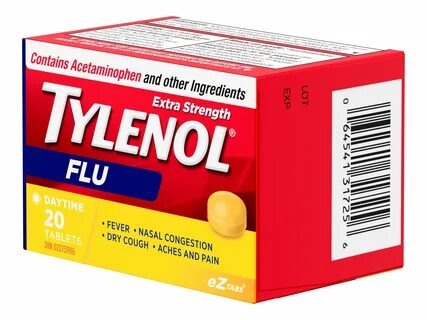When people in Canada feel the discomfort of nasal congestion, headaches, and sinus pressure, Tylenol Cold and Sinus is often one of the first choices at the pharmacy. While it can provide quick relief, many users are unaware of the possible side effects. Knowing these effects is important for safe use, especially if you have other medical conditions or are taking additional medicines. This guide will walk you through the most important details about Tylenol Cold and Sinus, focusing on side effects, safety tips, and what Canadians need to consider before using it.
What Exactly Is Tylenol Cold and Sinus?
Tylenol Cold and Sinus is an over-the-counter medicine designed to reduce common cold and sinus symptoms. It usually contains:
- Acetaminophen – to relieve pain and reduce fever
- Phenylephrine – a decongestant that reduces nasal swelling and pressure
This combination makes it effective against headaches, sore throats, sinus pain, and congestion. But like any medicine, it also comes with potential risks.
Common Side Effects of Tylenol Cold and Sinus
Most people who use Tylenol Cold and Sinus will not experience serious problems. However, some common side effects can occur, including:
- Mild dizziness
- Upset stomach or nausea
- Trouble sleeping due to the decongestant
- Dry mouth or throat
- Slight increase in blood pressure
These effects are usually temporary and mild, but they should still be monitored carefully.
Why Trouble Sleeping Happens
Phenylephrine, the decongestant in Tylenol Cold and Sinus, can act as a stimulant. This means taking it late in the evening might cause restlessness or insomnia. Canadians who take it at night may want to switch to an earlier dose.
Headache Rebound Effects
Ironically, overuse of Tylenol Cold and Sinus may cause rebound headaches. This happens when the body becomes too dependent on the medicine for pain relief, leading to more frequent headaches.
Serious Side Effects That Need Attention
While rare, serious side effects may occur. You should seek medical help immediately if you experience:
- Severe allergic reactions such as rash, swelling, or difficulty breathing
- Rapid or irregular heartbeat
- Severe dizziness or confusion
- Persistent high blood pressure
- Unusual liver symptoms such as dark urine or yellowing skin
These effects are uncommon but can become life-threatening if ignored.
Who Should Be Extra Careful With Tylenol Cold and Sinus
Not everyone should use this medicine freely. Certain health conditions increase the risks of side effects. Canadians should be cautious if they have:
- High blood pressure
- Heart disease
- Thyroid problems
- Liver disease
- Diabetes
- Glaucoma
If you fall into these categories, it’s best to consult a healthcare professional before using Tylenol Cold and Sinus.
Drug Interactions You Must Not Ignore
One of the biggest concerns with Tylenol Cold and Sinus is interaction with other medicines. Common conflicts include:
- Other acetaminophen products – taking more than one increases risk of liver damage
- Blood pressure medications – decongestants may reduce their effectiveness
- Antidepressants – especially MAO inhibitors, which can dangerously interact with phenylephrine
- Blood thinners – higher risk of complications when combined with frequent acetaminophen use
Always check with your pharmacist or doctor before mixing medicines.
Dosage Mistakes That Lead to Side Effects
Many side effects happen because of incorrect dosing. Canadians sometimes take more than the recommended dose, thinking it will bring faster relief. This is dangerous.
Safe Dosage Tips
- Always follow the instructions on the package
- Do not exceed the daily maximum of acetaminophen (usually 4,000 mg for adults)
- Avoid alcohol, which increases liver damage risk when combined with acetaminophen
- Keep track of other medications you’re using to avoid double-dosing
Natural Alternatives to Reduce Side Effects
If you’re sensitive to Tylenol Cold and Sinus, you may benefit from alternatives that carry fewer risks. Some helpful methods include:
- Steam inhalation for nasal congestion
- Saline nasal sprays to reduce dryness and swelling
- Rest and hydration to support natural recovery
- Honey and herbal teas for sore throat relief
- Humidifiers to reduce sinus irritation at home
While these may not fully replace medication, they can reduce reliance and minimize side effects.
How to Use Tylenol Cold and Sinus Safely in Canada
To make the most of Tylenol Cold and Sinus without risking health problems:
- Use it only when necessary, not as a long-term solution
- Monitor your blood pressure if you have heart concerns
- Avoid late-night doses to prevent sleep issues
- Keep it out of children’s reach, as pediatric use differs from adults
- Check Health Canada’s guidelines or speak with a Canadian pharmacist before combining it with other over-the-counter remedies
Key Takeaways for Everyday Canadians
Tylenol Cold and Sinus can bring quick relief from colds and sinus pressure, but being informed about its side effects is essential. From common issues like insomnia and dry mouth to rare but serious reactions such as allergic responses or liver damage, awareness is the best way to stay safe. Always respect dosage limits, avoid mixing it with conflicting medications, and consult healthcare professionals when in doubt.
By using Tylenol Cold and Sinus wisely, Canadians can balance fast relief with long-term safety, ensuring that this trusted medicine remains effective without unnecessary risks.

